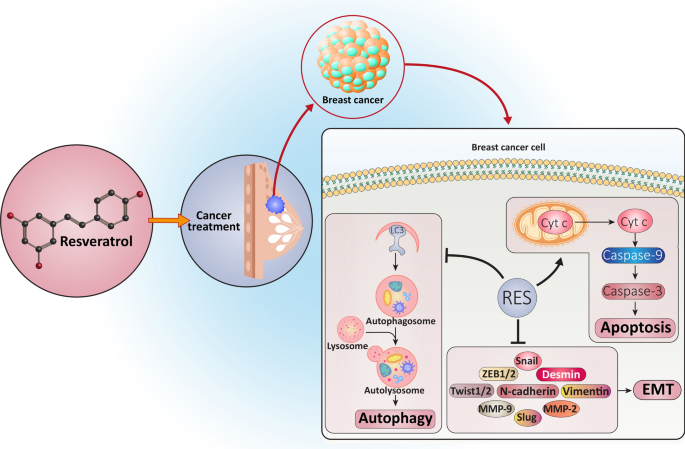Phytochemical Aromatase Inhibition
Estrogen Receptor Positive is a prevalent form of breast cancer that has been effectively treated by targeting the proliferative estrogen pathway. . Typically pre-menopausal women will be given SERMS (Selective Estrogen Receptor Modifiers such as Tamoxifen) which blocks the effect of circulating estrogen on receptor binding, thus inhibiting estrogen stimulation and function. Tamoxifen and SERMS also have significant adverse effects: increasing thrombosis, endometrial proliferation, and cancer stem cells.
Another category of hormonal therapies includes SEEMS ( Selective Estrogen Enzyme Modulators, such as Aromatase Inhibitors) including letrozole and Arimidex, which block the conversion of androgens to estrogens in the tissue by inhibiting the aromatase enzyme. SEEMS are primarily recommended to post-menopausal women. While most studies on resveratrol and its impact on cancer metabolism are murine or cell studies, the evidence is compelling. Most human studies have been focused on the cell-protective, anti-aging, anti-oxidant and anti-inflammatory properties of resveratrol. Here we take a look at the aromatase inhibition properties of resveratrol.
Resveratrol (3,5,4′-trihydroxy-trans-stilbene) is a phytochemical that belongs to the stilbenoids group of phytophenols. It is a natural plant compound found in the skin of red grapes, red wine, red grape juice, Japanese Knotweed (Polygonum cuspidatum), and in small amounts in some berries such as blueberries, mulberries, lingonberries, bilberries, red currants, cranberries and in small amounts in pistachios and peanuts.
 In one study both resveratrol, as well as melatonin, were found to be aromatase inhibitors and to have an inhibitory effect equivalent to letrozole, a commonly prescribed aromatase inhibitor drug.
In one study both resveratrol, as well as melatonin, were found to be aromatase inhibitors and to have an inhibitory effect equivalent to letrozole, a commonly prescribed aromatase inhibitor drug.
Although this was true in cell culture, it has not been seen in human studies, primarily due to the fact that resveratrol has a low absorption rate when taken orally.
Estrogen receptor-positive Anti-aromatase effect of resveratrol and melatonin on hormonal positive breast cancer cells co-cultured with breast adipose fibroblasts.
Another cell culture study demonstrated that resveratrol could inhibit aromatase at both the enzyme and mRNA expression levels and that there was a significant transcriptional control of the CYP19 gene which promotes cell proliferation in breast tissue. The research concluded that these phytochemicals can be used to target allosteric binding sites on the aromatase enzyme.
A more recent study demonstrated the anti-proliferative effect on Estrogen Receptor positive (ER+) breast cancer cells by effectively targeting allosteric binding sites on the aromatase enzyme by resveratrol, chrysin, and apigenin. The study also included berberine and pomiferin as promising phytochemical aromatase inhibitors. High-quality berberine is readily available and has a broad range of therapeutic actions including impacting over 20 pathways involved in cancer cell metabolism, inflammation, and bacterial pathogen control.
Wang Y, Lee KW, Chan FL, Chen S, Leung LK. The red wine polyphenol resveratrol displays bilevel inhibition on aromatase in breast cancer cells. Toxicol Sci. 2006 Jul;92(1):71-7. doi: 10.1093/toxsci/kfj190. Epub 2006 Apr 11. PMID: 16611627.
A similar study showed that resveratrol can inhibit the CYP19 promoter gene via transcriptional control by reducing estradiol mRNA abundance through aromatase inhibition. This leads to an anti-proliferative effect.
Wang Y, Ye L, Leung LK. A positive feedback pathway of estrogen biosynthesis in breast cancer cells is contained by resveratrol. Toxicology. 2008 Jun 27;248(2-3):130-5. doi: 10.1016/j.tox.2008.03.017. Epub 2008 Mar 29. PMID: 18462857.
The research on the impact of resveratrol on estrogen receptor-positive breast cancer proliferation and aromatase inhibition has fueled the development of several “enhanced” more bioactive resveratrol steroid analogues which may be more effective and have greater absorption than the form found in nature.
In my clinical experience, resveratrol is a weak aromatase inhibitor and does not offer the level of protection provided by pharmaceuticals, but is also well-tolerated and without many of the adverse effects of aromatase inhibitors drugs. (Joint pain, fatigue, sleep disruption, vaginal dryness, hot flashes). I will give 3-5 grams of pure resveratrol powder daily in 2 divided doses. To overcome the low absorption rate of resveratrol. I always give it a high-fat food such as nut butter or full-fat yogurt and mix in cinnamon and ginger not only to improve the taste but also to enhance digestion and absorption. This may be a good option for women who stop taking aromatase inhibitors due to unacceptable side effects negatively impacting their Quality of Life. Pharmacologic dosing of resveratrol can offer a mild aromatase inhibitory protective effect to these women along with over 50 additional pathways contributing to health and longevity.
Alhadrami HA, Sayed AM, Melebari SA, Khogeer AA, Abdulaal WH, Al-Fageeh MB, Algahtani M, Rateb ME. Targeting allosteric sites of human aromatase: a comprehensive in-silico and in-vitro workflow to find potential plant-based anti-breast cancer therapeutics. J Enzyme Inhib Med Chem. 2021 Dec;36(1):1334-1345. doi: 10.1080/14756366.2021.1937145. PMID: 34139914; PMCID: PMC8759730.
Kang H., Xiao X., Huang C., Yuan Y., Tang D., Dai X., Zeng X. Potent aromatase inhibitors and molecular mechanism of inhibitory action. Eur. J. Med. Chem. 2018;143:426–437. doi: 10.1016/j.ejmech.2017.11.057. - DOI - PubMed
Sainsbury R. The development of endocrine therapy for women with breast cancer. Cancer Treat. Rev. 2013;39:507–517. doi: 10.1016/j.ctrv.2012.07.006. - DOI - PubMed
Zhao H., Zhou L., Shangguan A.J., Bulun S.E. Aromatase expression and regulation in breast and endometrial cancer. J. Mol. Endocrinol. 2016;57:R19–R33. doi: 10.1530/JME-15-0310. - DOI - PMC - PubMed



